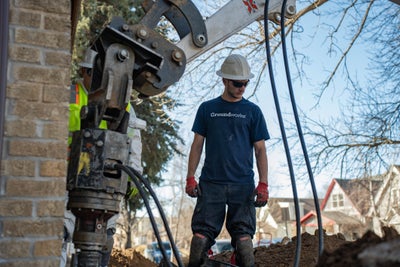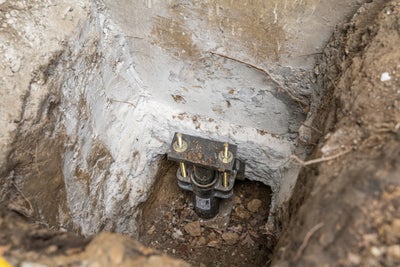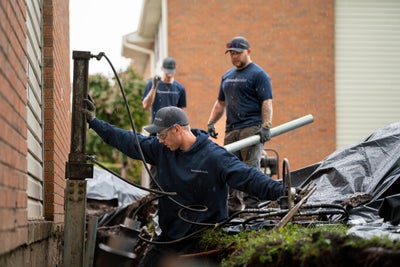How Do Foundation Piers Work?

A stable foundation is crucial for the safety and longevity of your home. It supports the entire structure. When a foundation starts to shift or settle, it can lead to serious problems, including cracks, uneven floors, and even structural failure.
Foundation piers are a key solution to addressing these issues. Understanding how they work can teach homeowners to make informed decisions about foundation repair and maintenance.
Noticing problem signs in your crawl space?
Book your appointment today!
What are Foundation Piers?

Foundation piers are a critical component in stabilizing and repairing your home’s foundation. Essentially, they are sturdy columns or shafts that are driven deep into the ground to reach stable soil or bedrock. The purpose of these piers is to support and lift a settling or shifting foundation back to its original position.
By transferring the weight of your home to these deeper, more stable layers of soil, they can prevent further movement and ensure a solid, level base for your house. Understanding how these piers work helps you grasp why they’re such an effective solution for foundation problems.
Types of Foundation Piers
Push Piers
Push piers are a popular choice for foundation repair. They are driven into the ground using hydraulic equipment until they reach stable soil or bedrock.
Once installed, these piers push against the soil to lift and stabilize the foundation. Push piers are particularly effective for addressing settling issues and can support significant loads, making them ideal for various foundation repair needs.
Helical Piers
Helical piers get their name from the “helical” (or screw-like) design that allows them to be screwed into the ground. This design helps them penetrate through unstable soil layers to reach more stable, load-bearing strata.
Helical piers are often used for new construction projects and foundation repairs because they can be installed with minimal disruption to the surrounding area. They are highly effective in both residential and commercial applications and provide strong support for foundations.
Slab Piers
Slab piers are specifically designed for homes with slab-on-grade foundations. These piers are installed beneath the slab to lift and stabilize it when it begins to sink or settle.
Slab piers work by drilling down through the slab and into the underlying soil or bedrock to provide support. They help address issues like uneven floors and cracks in the slab, ensuring that the foundation remains level and stable.
Installing Foundation Piers

The installation of piers involves several crucial steps to ensure the effective stabilization of your home’s foundation. It begins with an initial assessment, where professionals evaluate the extent of the foundation problems and determine the best type of piers for the job.
Next, excavation is carried out around the affected areas to provide access to the piers. Once the area is prepared, the driving or screwing of piers into the ground starts, where piers are installed until they reach stable, load-bearing soil or bedrock.
After the piers are in place, the team will lift the foundation back to its original position or as close as possible, correcting any unevenness or settling.
Finally, the area is backfilled to conceal the piers and restore the landscape, ensuring a neat and finished appearance. This comprehensive process helps ensure a stable and level foundation, addressing the core issues effectively.
Benefits of Foundation Repair
Foundation piers offer several significant advantages for stabilizing and repairing your home’s foundation. One major benefit is long-term stability and prevention; once installed, piers provide lasting support and help prevent future foundation issues by addressing the root causes of settlement.
They also offer a minimally invasive solution compared to other methods, causing less disruption to your property during installation. Additionally, they are suitable for various structures and soil types, making them a versatile choice for both residential and commercial applications. Whether your home is built on clay, sandy soil, or rocky terrain, piers can be customized to provide the support needed for a stable and level foundation
Signs your Home Needs Foundation Repair
Identifying early signs of foundation issues is crucial for addressing problems before they escalate. Foundation piers can be an effective solution when your home begins to show signs of settling or structural stress. Recognizing these indicators can help you determine if foundation piers might be necessary to restore stability and prevent further damage.
If you notice any of these signs in your home, it may be time to consider foundation repair. Addressing these issues promptly with professionals can safeguard your home’s structure and ensure long-term stability.
Trust Groundworks for All Your Foundation Needs

In conclusion, foundation piers are a powerful solution for addressing and preventing foundation problems, ensuring the stability and longevity of your home. By understanding the several types of piers and their installation process, you can make informed decisions about your foundation repair needs.
At Groundwork, we specialize in providing expert foundation solutions and offer free estimates to help you get started. If you have noticed any of the signs mentioned or have concerns about your foundation, contact us today to schedule your free inspection and take the first step towards a stable and secure home.
Noticing problem signs in your crawl space?
Book your appointment today!
Foundation Repair FAQ
The cost to repair uneven floors varies widely based on the cause and severity of the issue. Minor repairs may cost a few hundred dollars, while major foundation work can run into the thousands. Getting a professional estimate is the best way to understand the potential costs.
Foundation issues should always be addressed immediately. Minor cracks can sometimes be indicative of more serious structural concerns. It’s crucial to consult with foundation repair experts like Groundworks for a thorough evaluation and appropriate repair solutions.
Selling a home with foundation problems is possible, but you usually have to disclose the issues to potential buyers (which may lead to a lower sale price). Repairing the foundation before selling tends to get you a better price.
